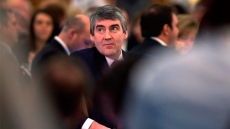OTTAWA - The federal government will have to weigh the potential risks of sliding oil prices before it starts doling out large tax cuts in advance of next year's election, economists warn.
Finance Minister Joe Oliver has promised the government would live up to its tax-cutting pledges despite a sharp fall in oil prices — thanks to a projected surplus in next year's budget.
But some economists say Oliver will be forced to pay close attention to the drop, which could well affect the bottom line in a country as dependent on oil production as Canada.
"The federal government revenues are extremely sensitive to what oil prices are doing," said Scott Clark, a former senior Finance Department bureaucrat and professor at Carleton University in Ottawa.
"If you listen to Mr. Oliver, he's very optimistic — in fact, almost unbelievably optimistic — about the surplus going forward. He seems to be downplaying the impact of the oil prices, or that lower oil prices will continue."
Oliver expressed his confidence once again this week after emerging from a meeting with private-sector economists, an annual consultation to discuss the country's economic outlook before the release of the fall economic update. The fiscal update is expected in the coming weeks.
While he acknowledged the low price of oil could stunt Canada's economic growth, Oliver reiterated his vow to bring tax relief to Canadians and table a balanced budget in the 2015 election year.
Oil has hit a two-and-a-half year low, the result of a drop that has already prompted the country's policy-makers to examine the potential pitfalls of lower prices.
Oliver has credited Canada's resource sector for financing Canada's social programs, but what happens when commodity prices continue to tumble — and don't immediately recover?
Meanwhile, economies around the world, like Europe and China, continue to struggle amid other risks like the expanding Middle Eastern conflict and the Ebola crisis.
Amid all the global uncertainty, Clark instead recommends an approach that would directly benefit the economy, rather than decreasing taxes.
"It's unclear to me why this is really a great time to be doing (tax cuts) — putting aside the politics, obviously."
Prime Minister Stephen Harper recently announced last year's deficit came in at $5.2 billion, much lower than the $16.6-billion shortfall projected in the budget. The government has predicted a $6.5-billion surplus for 2015-16.
The Conservatives made tax-cutting pledges in the last election contingent on a balanced budget, including income splitting for couples with children under 18 and a doubling of the annual limits for tax-free savings accounts.
TD Economics recently projected the government’s 2011 election commitments would cost nearly $20 billion through the 2019-20 fiscal year, or about one-third of the projected total surplus over that period.
The bank's Randall Bartlett said the promised tax-relief measures should still leave room in the surplus.
But he added that an extended period of low energy prices could shrink federal tax revenue and have a negative effect on the labour market.
"So, no doubt it will give them pause when they're making their decisions going forward," Bartlett said about the Conservative promises.
"But whether or not that impact is going to be so significant that it will cause them to change their views on the policies they would like to introduce, I don't know if that's the case."
In the short term, he said Canadian motorists will likely get to enjoy cheaper rates at the pumps, even though the economy performs better as a whole when energy prices are high.
Bartlett said the Canadian dollar, which has also fallen recently, could offset some of the losses by helping to encourage exports.
The Bank of Canada has announced plans to measure the impact of cheaper oil in its upcoming monetary policy report, scheduled for release next Wednesday.
Last week, Bank of Canada governor Stephen Poloz called the effect of oil prices difficult to assess, particularly when trying to determine whether the drop is a permanent decline or a short-term blip.




